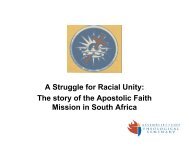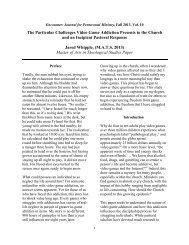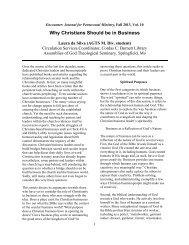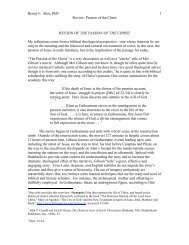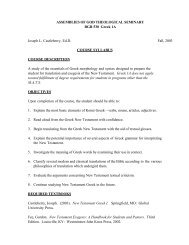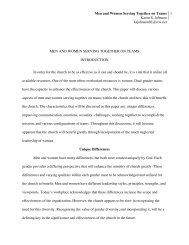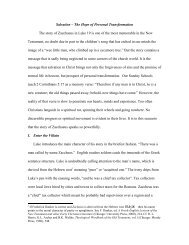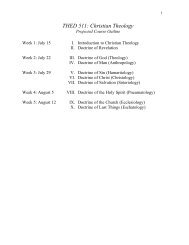Encounter: Journal for Pentecostal Ministry - Assemblies of God ...
Encounter: Journal for Pentecostal Ministry - Assemblies of God ...
Encounter: Journal for Pentecostal Ministry - Assemblies of God ...
You also want an ePaper? Increase the reach of your titles
YUMPU automatically turns print PDFs into web optimized ePapers that Google loves.
In his final chapter, Alexander turns from<br />
historian to theologian and locates ultimate<br />
dissolution <strong>of</strong> the pacifist position with the<br />
AG failure to ask: “What about Jesus?” As<br />
history will not correct itself, Alexander<br />
suggests an answer not by way <strong>of</strong> individual<br />
conscience or numbers, but by a return to<br />
the Scriptures. In view <strong>of</strong> the fact that the<br />
AG retains a high regard <strong>for</strong> the authority <strong>of</strong><br />
Scripture as “the authoritative rule <strong>of</strong> faith<br />
and conduct” (the first <strong>of</strong> the denomination‟s<br />
16 Fundamental Truths), Alexander finds<br />
the AG failure to examine the Scriptures<br />
astonishing. He notes that AG proponents<br />
dare not leave ethical questions concerning<br />
abortion and homosexuality to personal<br />
choice. Regarding Spirit baptism, he <strong>of</strong>fers<br />
poignant rhetoric: if „“initial physical<br />
evidence‟ has significantly less biblical<br />
support than non-violence…, could tongues<br />
as initial physical also be a matter <strong>of</strong><br />
conscience rather than <strong>of</strong> biblical<br />
interpretation?” 2 Given the impossibility <strong>of</strong><br />
such scenarios, Alexander implores<br />
<strong>Pentecostal</strong>s to search the Scriptures and<br />
discover afresh the non-violent story <strong>of</strong><br />
Jesus and Acts as an insistent critique <strong>of</strong><br />
racial, economic, and socio-political<br />
acculturation.<br />
Readers may not agree with Alexander‟s<br />
conclusions, but his work deserves a wide<br />
readership. Peace to War is a riveting story<br />
by a quintessential theologian. Alexander<br />
chronicles the risks and consequences <strong>of</strong><br />
1 <strong>Pentecostal</strong> Evangel, October 12, 1940, 13.<br />
2<br />
conscientious objection alongside a shifting<br />
and accommodating worldview. His keen<br />
awareness <strong>of</strong> <strong>Pentecostal</strong> history is matched<br />
by critical theological and exegetical insight.<br />
He dialogues with <strong>for</strong>midable scholars<br />
including <strong>Pentecostal</strong>s such as William<br />
Menzies, Walter Hollenweger, Jay Beaman,<br />
Murray Dempster, and Joel Shuman, as well<br />
as non-<strong>Pentecostal</strong> sympathizers like Glen<br />
Stassen (Foreword), John Howard Yoder<br />
and Stanley Hauerwas. With prophetic<br />
candor, Alexander calls the AG to foster<br />
careful thinking and dialogue in hope <strong>of</strong> a<br />
fresh renewal <strong>of</strong> the crucifist life, that is,<br />
discipleship as the way <strong>of</strong> the cross. He<br />
writes first and <strong>for</strong>emost to <strong>Pentecostal</strong>s<br />
unaware <strong>of</strong> and/or in disagreement with the<br />
early <strong>Pentecostal</strong> practice <strong>of</strong> non-violence.<br />
Peace to War should also serve the broader<br />
Christian community. Readers from historic<br />
peace churches (note the Anabaptist<br />
publisher) will not only be surprised at a<br />
<strong>Pentecostal</strong> peace heritage, but be<br />
challenged to reflect upon their potential <strong>for</strong><br />
“drift,” the careless loss <strong>of</strong> an integral<br />
distinctive. Given the current global crises,<br />
readers from all traditions should find it<br />
stimulating to think deeply about their<br />
individual and collective response to war.<br />
Finally, Peace to War is well-suited <strong>for</strong><br />
numerous undergrad and graduate courses<br />
such as <strong>Pentecostal</strong> and/or American<br />
religious history, theology, ethics, and<br />
sociology/philosophy <strong>of</strong> religion.<br />
2 Paul Alexander, Peace to War: Shifting Allegiances in the <strong>Assemblies</strong> <strong>of</strong> <strong>God</strong>, The C. Henry Smith Series<br />
9 (Tel<strong>for</strong>d, PA: Cascadia Publishing House, 2009), 340.



